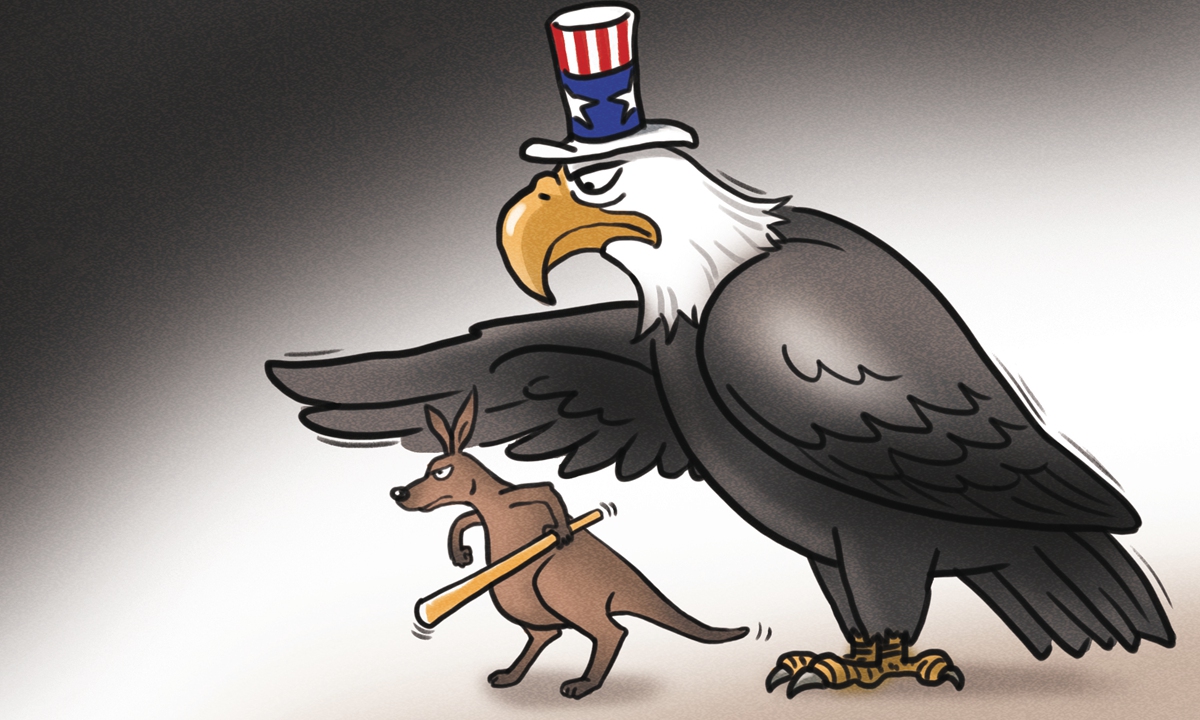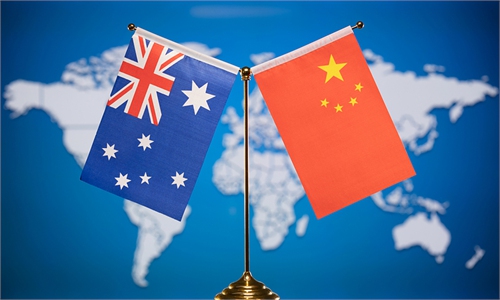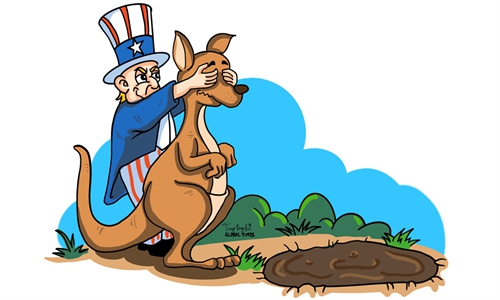Australia finds itself in embarrassing situation amid China-US exchanges

Illustration: Liu Rui/GT
Acting as a vanguard of the US anti-China strategy, Australia has forced its own diplomatic options into a corner. When Canberra realizes that the US' China strategy is not as extreme as it thought, it will only find itself in an awkward situation.
For example, The Australian published an article on Monday entitled "US-China talks threaten to isolate Australia." Considering the room for cooperation between China and the US on climate change and Afghanistan's situation, the article reads that "relations between the US and China have taken a sudden turn which may well impact on Australia."
According to the article, US climate envoy John Kerry will visit China in September to discuss strategies for the Glasgow climate summit in November. "Australia has no governmental contacts with China so must rely on the US to discover outcomes from Kerry's visit to China," the article reads. Moreover, since China and US may reach a climate accord, "Australia cannot afford to go to Glasgow with a stance that is incompatible with China and the US."
This shows that by taking the lead in following Washington to provoke Beijing, Canberra has limited its own diplomatic options. Although the Biden administration regards China as its main strategic rivalry, the US still inevitably needs to communicate with China on hotspot issues such as climate change and Afghanistan.
Likewise, it is impossible for Australia to completely cut exchanges with China as well, as long as Canberra wants to contribute in global affairs. But in recent years, Australia has made fundamental mistakes in its China policy. This has gravely hindered the two countries' normal dialogues. On the one hand, the worsening China-Australia relations have made people question the Morrison government's ability in handling foreign relations; on the other hand, since China and the US have maintained dialogues despite their differences, the situation has become embarrassing for Australia.
To some extent, the Morrison government's conservative stance on climate issues has led to criticism and isolation against Australia in the international community. In such a context, Canberra's China policy will be further criticized domestically.
The article said that China's military capacity and the chaos in Afghanistan means that Kerry will not "lecture" China and this is "a lesson for Australia." Obviously, Australia has misjudged the US policy toward China. Washington knows all too well that China will never accept its lecturing. While the China-Australia relationship is still in a stalemate, China and the US have explored more room for conversations. This has left Canberra in a dilemma.
The US' hasty withdrawal from Afghanistan is a heavy blow to its international reputation. Many US allies and partners, including Australia, followed Washington in the invasion of Afghanistan. But after paying a heavy price over decades - huge military expenditures and lost lives of soldiers - these countries are not even able to withdraw in a decent way. The mess left Afghanistan is a big shame for the US and its allies.
Thus, many US allies and partners now have doubts about the reliability of the US. The US no longer holds the global hegemony as it did at the end of the Cold War, and its security commitments to allies do not seem so reliable anymore.
In recent years, Australia has continued to strengthen its alliance with the US in terms of diplomacy. In so doing, it has mainly hoped to ensure its security through the US-Australia alliance. Therefore, Australia continues to support the US both militarily and diplomatically. It has chosen to tilt completely toward the US in its China policy. This has clearly led to the deterioration of China-Australia relations.
Could Australia handle its relations with China more reasonably? Is it wise for Australia to maintain the alliance with the US at the expense of China-Australia relations? Obviously, Canberra has trusted Washington so much that it does not even want to think about these questions.
Although there are many voices questioning the US' reliability, there is still broad support in US-Australia alliance in Australia. But maintaining the Australia-US alliance does not necessarily mean sacrificing China-Australia relations. Canberra should still have some leeway in its US and China policies, and this is where Australia's current foreign policy fails the most: It hasn't made good use of its leeway at all. Instead, Australia has burned bridges behind itself.
The author is an assistant research fellow at the China Institute of International Studies. opinion@globaltimes.com.cn


